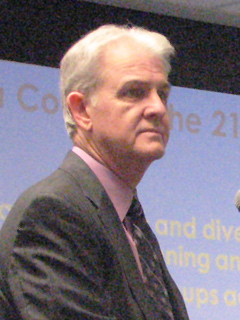Interview with Director Jim Cosby on Restrictive Housing
 Information Center: Talk a little bit about the work you did on the presidential panel that reviewed the DOJ polices on Restrictive Housing?
Information Center: Talk a little bit about the work you did on the presidential panel that reviewed the DOJ polices on Restrictive Housing?
Director Cosby: First, let me say that I was honored to serve as NIC’s representative on the panel. It was truly wonderful to serve with committed colleagues from throughout the Department of Justice on such an important topic in the field of corrections.
My contributions were related to the importance of recognizing the positive effects of diversion, especially of the mentally ill at the jail level. It is much better for all involved to train officers in the field to recognize signs of mental illness and then act to connect the individual to treatment resources in the community. It lessens the collateral consequences that come with incarceration and gets a better overall result where diversion and treatment are possible.
The heavy lifting however, was done by my colleagues from the Bureau of Prisons (BOP) especially former Director Charles Samuels, who had already taken steps to improve restrictive housing within BOP prior to the panel convening. The Bureau has made and continues to make significant strides in this area.
Information Center: What is the importance of the 53 guidelines the DOJ released?
Director Cosby: The guidelines provide a framework for federal, state, and local jurisdictions to use when considering their policies around restrictive housing. It is important to establish a standard of care for individuals for whom it is necessary to restrict their movements within a facility. We do not want to exacerbate the restrictive housing situation of any individual in custody. The guidelines, and especially the guiding principles, are designed to better and more humanely manage individuals in custody - with the safety of staff, incarcerated individuals, and the public a top priority.
Information Center: Could you expand on /explain NIC's philosophy in regards to restrictive housing ? What is NIC’s role in helping local and state agencies move in that direction?
Director Cosby: Even before the report was released, NIC’s philosophy has been based on the concepts underlying the nine guiding principles. For example, we should use the least restrictive setting necessary to ensure the safety of incarcerated individuals and staff. Further, the principles provide guidance on creating a clear plan for returning the person to less restrictive conditions as promptly as possible. It should be the goal of any restrictive housing program to have well trained staff, regularly evaluate their policies, and increase the amount of time individuals in restricted housing spend outside the cell.
Our role in implementing the guiding principles goes to the heart of the NIC mission as it relates to training. We will train teams of three from 30 states this fiscal year regarding the new restrictive housing practices and DOJ guiding principles. We have recently updated our curriculum including the guiding principles and are moving forward with the training events.
Information Center: I understand you are focused on reducing the number of people who are incarcerated altogether. Can you talk about that?
Director Cosby: It is widely recognized that the United States is the world’s leader in incarceration rates. This is not an accolade and is not a statistic that we want to continue in the future. Further, NIC is hard at work to have an impact in this area. Our initiatives on pre-trial, diversion, dosage-based probation, veteran’s treatment courts, employment retention, and bail reform - just to name a few - are all designed to safely reduce incarceration. The literature demonstrates we can safely maintain more individuals in the community than we presently are, eliminating the collateral consequences of incarceration. This is a better approach to criminal justice issues and better overall for our communities.
Information Center: What do you think the public is NOT talking about that maybe people should be discussing?
Director Cosby: That's a great question - what we talk about represents our values and what we think is important. There is research on what is commonly called “redemption.” It is a simple idea with potentially a profound impact. The literature indicates individuals who have desisted from crime for a certain period of time are no more likely to commit another crime than anyone without a criminal record. Yet we continue to exact a price and punish most people with a felony conviction for the rest of their lives. They often have to contend with the felony record regarding employment, business licenses, housing, and other aspects of life. It does not make sense to continue to put up barriers in life for individuals with a felony conviction long after they have desisted from crime. For a nation that believes in second chances, we can - and should - do better.
